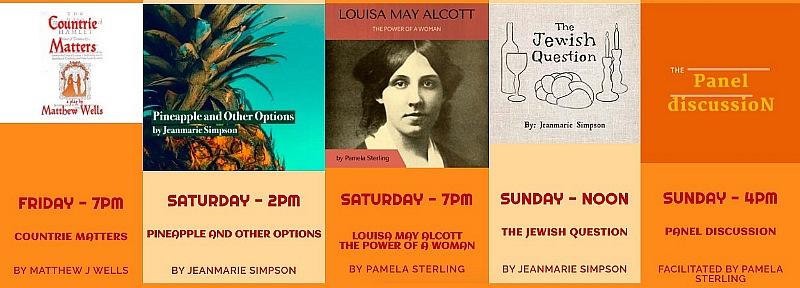
ATM Productions today announced that its Fall Theater Festival will celebrate theater’s underrepresented “Grand Dames”—strong, mature female artists who seldom play leading roles despite the majority of this demographic in the population of performers, directors and playwrights and patrons. The festival thus continues the ATM tradition of inclusivity for all. ATM puts the spotlight on women over 40 in four productions, presented over a Zoom link from October 23 through October 25. ATM chose the powerful plays Countrie Matters, Pineapple and Other Options, Louisa May Alcott – The Power of a Woman, and The Jewish Question.
Festival Director Jeanmarie Simpson, shares, “Ironically, women rich in life and artistic experience are most often excluded. It’s one of the great sins of the theater, frankly, and we’re seizing the moment.
ATM embraces a tradition of diversity, including people with and without disabilities. Simpson adds, “During this time of socially distanced theatre, ATM has assembled an ensemble from coast to coast, including six magnificent women in great roles.”
Festival audiences are sure to laugh, cry, and gasp during the four plays.
COUNTRIE MATTERS, BY MATTHEW WELLS, is the story of a man who never did make up his mind. On the night his father’s ghost told him to avenge his foul murder, young Prince Hamlet thought about it for five minutes, said “Screw this,” and rode off to Wittenberg, where he became a model student. And now it’s thirty years later. Claudius died in bed. Gertrude is in a nunnery. Ophelia is married to Fortinbras. Hamlet is King of Denmark. And because the international situation is so precarious that Denmark needs a matrimonial alliance, Hamlet has reluctantly agreed to marry Fortinbras’ 23-year-old daughter. Over Ophelia’s dead body.
PINEAPPLE AND OTHER OPTIONS, BY JEANMARIE SIMPSON, opens as drenching rain pummels Nimipuu County. Helen, an idealistic middle-aged American History educator, sits alone in her kitchen recovering from a double mastectomy and looking at a pile of bills and an employment termination letter. What makes more sense than suicide? A newly retired social-worker who’s now a rookie crisis hotline volunteer, AJ sits alone in the office desperate to save Helen from herself. As Helen slips between the worlds after eating a huge assortment of pills, Elizabeth “Betsy” Pennington greets Helen and takes her on a journey designed to convince her to return and invent a new kind of educational model. Pineapple and Other Options braids the stories of three women into a – literally – constructive theatrical experience.
LOUISA MAY ALCOTT: THE POWER OF A WOMAN, BY PAMELA STERLING, was written partially to commemorate the 100th anniversary of the ratification of the 19th amendment to the US Constitution, which gave women the right to vote on August 18, 1920. Louisa May Alcott fought for equal rights for women her entire life, and her struggles to earn a living in a career reserved for men, to be treated with equal respect, to negotiate the challenges of life and work balance, parallel many of the challenges women still encounter today. Alcott was also an inveterate traveler. Her childhood consisted of moving from place to place throughout New England following her father’s Transcendental lectures and communal experiments, while her mother was the parent who ultimately worked to keep a roof over their heads and food on the table. This solo play brings the audience into the “rooms in confusion” of Alcott’s mind, as she prepares to put them in order so she may embark on an important journey.
THE JEWISH QUESTION, BY JEANMARIE SIMPSON, takes place “not long ago” on the day of the biggest political demonstration in Los Angeles history. A million people are marching from Venice to downtown. Grace is putting the finishing touches on the sabbath meal as Rebecca and Ash, a photojournalist and reporter, arrive from the march. Ash is bleeding, Rebecca is exasperated, and Grace is excited to see her niece again. A classic Kitchen Table play, The Jewish Question confronts, examines, and embraces age-old misunderstandings, stereotypes, and culture. Plus, there’s wine and homemade bread.
ATM Productions believes that film and stage should be accessible to everyone, regardless of physical ability. ATM emphasizes empowering artists and patrons who are underrepresented in mainstream theater. ATM is inclusive of race, color, religion, sex, national origin, age, ability, veteran status, sexual orientation, and gender identity in its programs and activities.
ATM accepts donations for any amount for the Fall Festival. The audience is encouraged to order tickets and pay what they can. A Zoom link will be sent to the ticket-holder’s address. For convenience, an All-Access Pass is available for $50
A panel discussion facilitated by Pamela Sterling and unpacking the meaning and significance of “radical inclusion”, will be held on Sunday, October 25 at 4 pm.
For more information or to reserve tickets, go to atmproductions.org


